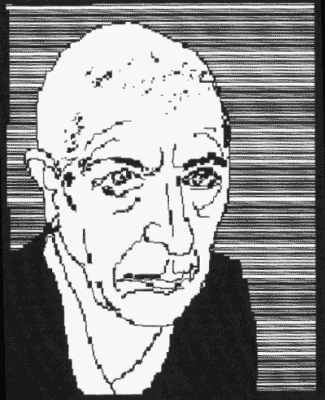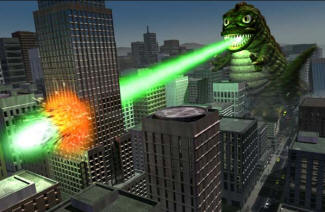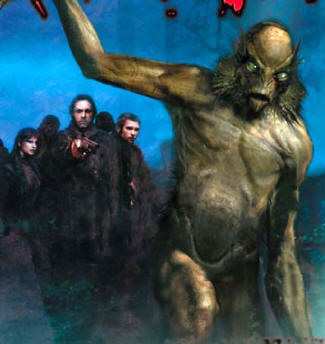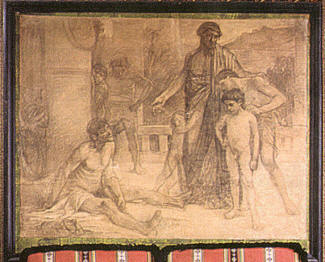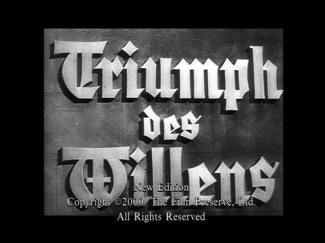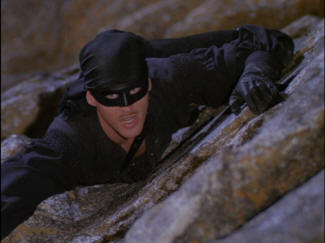PART 1 OF 2
KILLER KRISHNAS FROM INNER SPACEby Charles Carreon
November, 2003

I had never thought particularly ill of the “International Society for Krishna Consciousness” (“ISKCON”) until I read Monkey On A Stick -- Murder, Madness, and the Hare Krishnas by John Hubner and Lindsey Gruson, published in 1989. I discovered the book on a paperback rack in 1999 while standing in an A&P grocery store killing time one evening in Daytona, Florida. Initially captivated by the almost-unbelievable tale of how a gang of pedophile vegetarians ran an international sex and drug ring under the guise of a charity and service, I returned to the story several times, and have now produced an up-to-date telling of how one more hippie dream went horrendously sour with the help of this kooky little thing called “Eastern religion.” This article is separated into two parts, a summary of some of the most lurid stories that appear in Monkey On A Stick, and the legal story, drawn primarily from legal documents and news reports about the aftermath of the IKSCON pedophilia scandal.
Monkey On A Stick covers the time period in the mid-to-late eighties, when eleven Western "gurus" ruled the ISKCON empire, after the death of founder Swami Prabhupada, and abused their power over hundreds of thousands of Krishna devotees. Based in India, the virulent, perverted nature of the cult that operated under the acronym ISKCON, “International Society for Krishna Consciousness,” has never been fully known. This book is well worth reading, whether you are looking for good reasons to avoid getting into a religious cult, or are simply a devotee of the true crime genre.
The most horrific events in the book center around sex, murder and drug dealing at a West Virginia temple called “New Vrindaban,” founded by Keith Ham, a New York homosexual who dropped out of the Columbia grad school religious department to become an early devotee of Prabhupada and took the name Kirtananda (“Blissful-in-sacred-song”). Kirtananda and his partner Howard Wheeler, who joined at the same time, rose high in the Krishna hierarchy. Both were perverts to the core. Wheeler opended a temple in Ensenada, Mexico near the flesh markets of Tijuana, and enjoyed the free access to the bodies of poor children as only pedophile could. Kirtanananda shielded from a teacher from prosecution who publicly sodomized many young Krishna children in his classroom in front of their peers, and shipped him to India as the police were closing in with an arrest warrant.
If you went to an airport in the seventies, you may have wondered what would happen with the money if you gave a young devotee money in exchange for pseudo-ecstatic dancing, repetitive music, simpy smiles, and cheap incense. Read this book and wonder no longer. The official name for the platoons of urban change-scavengers was "sankirtan groups," but they were colloquially referred to as "scam-kirtan." Armies of young women, bullied by cynical, pimpish fellows, wrung innumerable dollars from the pocketbooks of tired Americans, meeting a usual quota of $300 a day, or getting a beating to cover the difference. These young women were also often sexual playthings for the heterosexual appetites of the more plebeian devotees who went for that sort of thing. Kirtanananda also collected millions from drug dealing and money laundering, and directed rings of scam-operators who solicited donations in the name of Vietnam veterans, hungry children, etc.
Kirtanananda was reportedly inseparable from a young boy called Samba, who sat at his side at all times, and with whom he often slept. Kirtananda was also unquestionably a woman-hater. He counseled men to beat their wives “like their prayer drums” – because it would improve them -- and despised audiences with women devotees, describing the occasion as "fish night," when extra incense had to be burned to counter the odor of women. According to the authors, the entire Krishna empire became a magnet for homosexuals with a lust for power, after Prabhupada, disenchanted with the 80% divorce-rate that afflicted the numerous marriages between devotees that he had arranged by edict, decided that only sannyasins, (male) "renunciates," could take leadership positions in the organization. While “celibacy” was enjoined upon male sannyasins, staying in the closet was no problem for these skirt-wearing, chanting, dancing worshippers of Vishnu.
Kirtananda’s management of New Vrindavan was similar to the style that Leona Helmsley would have adopted if she’d been operating the Vatican. Little people would of course sometimes get hurt when God went about His business. So there were a few shallow graves here and there on the property — big deal. The temple roof was leafed with gold, and the floors were pure marble. The architecture overawed with splendor, lifting the mind to God. Lots of people felt very peaceful and divine there, leading them to part with a check or a stack of ill-gotten cash.
Kirtananda was as blatant about ruling by terror as Don Corleone. He expressly ordered the horrifying murder of Chuck St. Denis that's chillingly described in the book’s opening chapter. He was shot twelve times with a .22, and repeatedly stabbed in the chest with a kitchen knife while being exhorted to chant Krishna’s name so that he would be reborn in the Hindu heaven. As the life fled from him, he howled like a dog, so the killers cracked his skull with a hammer. Even after all that, as they wrapped his body in a plastic tarp, he opened his eyes and warned them not to do that, because then he wouldn’t be able to breathe. They buried him under a stream, which is probably a good way to make a spirit unquiet, and perhaps that is why his cries, which vanished into the West Virginia night, echoed on, causing rage to burn even in the hearts of idiot mouse-like devotees accustomed to burying their fears in monotonous chanting.
Kirtananda, quoting one of Prabhupada’s quaint Indian sayings, likened the murder of St. Denis to impaling "a monkey on a stick" to frighten other monkeys, and for a long time it worked. Everyone in New Vrindaban knew that St. Denis had been killed on Kirtanananda’s orders by his personal thug, Tom Drescher. No one dared to speak out because Drescher lived under Kirtananda’s express protection, in the lap of privilege, right there in New Vrindaban. Undermined by Kirtanananda's financial influence, the local police and prosecutors didn’t act against Drescher.
But justice sometimes finds its vehicle. One day a deranged devotee spontaneously attacked Kirtananda with a three-foot steel rod, making serious dents in his brain. Kirtananda barely survived, and ever after walked with a cane, suffering headaches and double vision. Even in that debilitated state, however, Kirtananda maintained his corrupt grip on the faithful, and directed Drescher to kill Steve Bryant, the New Vrindaban exile who considered it his mission from Krishna to expose Kirtanananda's abuses, and had been publishing the embarrassing truth. Drescher killed Bryant in LA, which caused the pot to boil over, and resulted in his prosecution and conviction for St. Denis’ murder. Now serving a life sentence in prison, Drescher has nevertheless has been elevated by his service to Krishna to the status of holy assassin, a destroyer of unbelievers. In a special ceremony conducted by Kirtanananda, he was given authority to initiate prisoners in the Hare Krishna path, and has several followers inside.
The Legal Story
Kirtananda Convicted and Released After A Few Years In Club FedThe story that the authors of Monkey On A Stick tell about the ISKCON cult has been confirmed by subsequent revelations. In February 1987, the New Vrindavan was closed and the principal fled the country as law enforcement closed in. On February 17, 1987, Frederick DiFrancesco and and Larry Gardner were indicted on child molestation charges, and although Kirtananda denounced the investigation and charges as mere persecution, in 1990 the Feds indicted him on five counts of racketerring, six counts of mail fraud, and conspiracy to murder St. Denis and Bryant. A jury convicted him of all but the murder-conspiracy charges, but the verdict was reversed on the grounds that testimony about the child molestation had prejudiced the jury. In the midst of a retrial, he pled guilty to one count of racketeering, and was sentenced to twelve years in prison. Released in 2004, he was received, as the New York Times put it, “into the welcoming arms of his congregation,” notwithstanding that ISKCON had discharged him from his religious position after concluding he was a pedophile.
The Texas Racketeering Lawsuit Against ISkCON Well-known Texas trial attorney Windle Turley filed a federal lawsuit [online at
http://www.harekrsna.org/gurupoison/sup ... y-case.pdf] in 2000 on behalf of around 50 innocent children whose parents left them in the care of pedophiles while they worked the streets, scrounging cash to buy gold roofs and fancy cars for the heirarchy. Turley named 16 corporate defendants based in Texas, Pennsylvania, New York, Washington, Florida and California, seven defendants in their capacity as Executors of the Estate of A.C. Bhaktivedanta Swami Prabhupada -- Gregory Gottfired, Robert Grant, Thomas Hertzog, Ghopal Khanna, Howard Resnick and Glen Teton – and 18 more defendants as members of the Governing Body of Commissioners of ISKCON (the “GBC”). These defendants, by legal name and Krishna name, were FARAMARZ ATTAR (“Atreya Rsi das”), CHARLES BACIS (“Bhavananda das”), WILLIAM BERKE (“Bali Mardan das”), ROBERT CORENS, (“Rapanuga Swami”), WILLIAM DEADWYLER, III (“Ravindra Svarupa Das”), WILLIAM EHRLICHMAN (“Bhagavan Swami”), JOHN FAVORS (“Bhakti Tirtha Swami”), STEVEN GOREYNO a/k/a STEVEN GUARINO (“Satsvarupa das”), MICHAEL GRANT (“Mukunda Goswami”), KEITH HAM (“Kirtanananda”) resides, THEODORE RICHARD HARRIS (“Panca Dravida Swami”), THOMAS HERTZOG (“Tamal Krishna Goswami”), JEFFREY HICKEY (“Jagadish das”), GOPAL KHANNA (“Gopal Krishna Goswami”), HANS KARY (“Hansadutta Swami”), WILLIAM OGLE (“Balavanta das”), HOWARD RESNICK (“Hrdayananda das Goswami”), BRUCE SCHARF (“Brahmananda”).
Turley’s complaint alleged that ISKCON became a den of thieves and a one-stop-shop for pedophiles, who in exchange for donations, would find a perv-friendly environment, a ready supply of compliant victims, and cover from investigation and prosecution.
“ISKCON and its leaders …enriched themselves by granting special favors to large fund raisers and donors, even if some large donors were drug dealers and other criminal elements. The special favors include, among others:
(a) Granting teaching positions to sexual predators so they would have access to children for their sexual gratification;
(b) Giving young girls from the gurukulas as brides to older donor men;
(c) Creating “asylum” and a ring of protection against apprehension of fugitives, including those dealing illegally in arms, drugs and murder, within the ISKCON enterprise;
(d) Destroying evidence and failing to report criminal conduct on the part of ISKCON and devotees.”
Turley further alleged that under the cover of being an international religious organization, ISKCON offshored its perversities in India, where sexual abuse of children is culturally accepted, rarely investigated, and virtually never prosecuted.
“In a conscious effort to avoid policing and scrutiny by U.S.A. child protection agencies, ISKCON took a large portion of its boarding school activities overseas to India. In India, ISKCON managed at least two profoundly abusive boarding schools for boys. These were the Vrndavan and Mayapur schools. Both were staffed and controlled by appointees of ISKCON who were, for the most part, assigned from the United States. The students sent there were almost exclusively from the United States, and the management policies, devised and implemented by the GBC, originated in the U.S.A. The Indian schools were among the worst offenders and abusers of minor boys, and many of the Indian school teachers and leaders were also teachers, leaders and abusers in United States schools.”
Turley’s complaint alleged alleged that devotees were required to put their children in the “gurukula” boarding schools, which were basically pools of children who were rented to pedophiles.
“Some examples of the types of abuse and neglect to which the children, ranging in age from 3 years to 18 years, were subjected include but are not limited to:
· Sexual abuse including rape, oral sex, intercourse with children, sexual fondling of children, and masturbation with children.
· Physical beatings of children with boards, branches, clubs, and poles.
· Physical beatings by adult teachers and school leaders with fists to the head and stomach.
· Kicking the children into submission.
· Children were in some instances made to walk great distances in bitter cold, including snow and rain, without jackets, coats, or shoes.
· Children were often forced to sleep on cold floors and in unheated rooms.
· Children were frequently deprived entirely of medical care [for] malaria, hepatitis, yellow fever, teeth being knocked out, broken facial bones, and broken bones in their hands, often inflicted as they attempted to shield themselves from beatings.
· Children were sometimes kept in filthy conditions. In at least one instance, a local group utilized what had recently been a cattle or horse barn for a nursery.
· In almost every school the children were kept in severely overcrowded conditions, often forced to sleep shoulder to shoulder on the floor or in small rooms in three-high bunks with 10 or 12 children to each tiny room.
· The children were physically abused by being awakened every day in the early morning hours (generally at 4:00 a.m.) and subjected to a cold shower, after which they were taken, without any breakfast, to a daily religious service. At some schools, the children were forced to walk great distances in the dark to attend the service, and often in cold or rainy conditions, clothed only in their thin gown-like “dohti.”
· The children were not provided bathroom tissue, but instead were expected to wipe themselves with their fingers, after which they would dip their fingers into a bowl of water.
· As punishment for not cleaning themselves thoroughly, children were scrubbed with steel wool until their skin was raw and sometimes bleeding.
· Children were abused when they were forced to sleep on their wet blankets or in tubs as punishment if they wet their bedding.
· Some children were forced to wear their soiled underclothes on their heads for long periods of time because they had wet themselves.
· Children were often forced to go without food entirely, either because there was none, or as punishment. When food was provided, it was always inadequate for a growing child’s diet.
· The inadequate food that was provided was often prepared in unsanitary conditions, was of very poor quality and so unpleasant that even hungry children frequently could not eat it. In at least one school, the children learned as a matter of routine to remove insects from their food before eating it.
· Each child was expected to eat what they were provided. If they did not do so, their served portion was kept on their plates until the next meal when it was served again. This process often continued until the cold food -- even moldy and insect-infested -- was swallowed.
· In some schools, children were forced to lick up their vomit from any foul food they may have thrown up.
· At New Vrindavan, three young boys, about six or seven years of age, who worked in the kitchen, took some food to their hungry friends. They were caught and punished by being gagged, having bags placed over their heads, and being put in a small room for several days with only a bucket for their waste and no food or water. One of the same boys was later slammed by a teacher into a marble wall, resulting in a loss of some teeth and fractured facial bones.
· Children were controlled by various threats to hurt or kill them and by punishments. Young children, strictly limited to a vegetarian diet, were continually terrorized when told that non-Krishnas were meat-eaters, that they ate each other, and that the children, if given to or taken by the meat-eaters, would themselves be eaten.
· Children often saw rats in their rooms and schools. Some children (such as those at the school in Dallas) were told the rats lived in a particular old closet, and the child would be, and often was, placed in the closet if they didn’t do as told.
· One form of punishment included forcing little children to stand on a crate for long periods of time in a darkened closet “so the rats would not eat them.”
· Very young children were in fact placed in those dark and locked closets and left afraid and crying for hours at a time. They were locked overnight in dark cellars with dirt floors. One young child was made to sleep alone in the loft of a cold barn for many nights.
· Sometimes the children were sent by their superiors to massage and bathe the religious gurus and then drink their now “blessed bath water.”
· In some cases, children were stuffed into trash barrels for periods of two to three days, with the lid on, as punishment for relatively trivial “sins.”
· Children were almost universally told that if they disclosed their condition or complained to their parents or others, they would be severely punished. When complaints were made, the children were publicly and often severely beaten or subjected to other forms of punishment.
· Girls, as young as 12 or 13 years, were frequently “given” or “promised” to an older male in the movement. Although their marriages were generally not sexually consummated until the child was at least 16 or 17 years old, the little girls were terrorized by the threats, and often reality, of being given away by their leaders to become engaged to marry “strange old men.”
· Children were often forced to lie awake in their beds or sleeping bags and listen as their little friends were sexually molested by teachers and other leaders.
· The children were emotionally abused by subjecting them to near-total parental and societal isolation. In an effort to totally control their minds, the children were, in most cases, separated and isolated from their parents and were not allowed to have regular contact with their parents. Personal visits, correspondence, and telephone calls were either forbidden or discouraged. Gifts, particularly of food, were intercepted. For example, one young boy felt abandoned by his parents, and had no contact with his family for more than a year. He later learned the one small package of cookies sent by his mother was intercepted and kept from him.
· Children were frequently moved to different schools in different states without the consent (or, sometimes, knowledge) of parents. Some children were hidden from parents. Some boys were shipped out of the country to ISKCON schools in India. In at least some cases, after the parents discovered their child’s whereabouts and made arrangements for them to come home, their plane tickets were intercepted, and torn up in front of the children. Then, these children were punished for their parents’ attempt to bring them home.
· Even though the children were given by their parents to ISKCON to educate, except for the reading of their “vedic scriptures,” the children received little or no education.
· Because of near-total isolation from the outside world and lack of education, the children who remained within the ISKCON schools for extended periods of time were totally unequipped to enter outside society. They have experienced extreme difficulty in earning a living, entering and maintaining relationships, including marriage, and in adapting to the laws and regulations of society. Many are in need of extended psychological and/or vocational training, rehabilitation, and medical care.”
Helping Hands From The Religious Establishment Reach Out To Aid ISKCON Strangely enough, mainstream U.S. churches supported ISKCON in its efforts to get the lawsuit dismissed. The following groups joined in filing a “friend of the court” brief urging Judge Sam Lindsay to dismiss the case on the grounds that a church could not be legally characterized as a “racketeering” organization, and thus there was no federal law on which the court could base its exercise of jurisdiction over the defendants.
1. The American Jewish Congress
2. Baptist Joint Committee on Public Affairs
3. Christian Legal Society
4. Christian Life Commission of the Baptist General Convention of Texas
5. The Church of Jesus Christ of Latter-Day Saints
6. The Evangelical Covenant Church
7. The First Church of Christ,Scientist
8. General Conference of Seventh-day Adventists
9. General Assembly of the Presbyterian Church (U.S.A)
10. National Council of Churches of Christ in the United States
11. United States Catholic Conference
Affecting a pious and disinterested tone, these eleven churches, each of which has now been implicated in the ever-widening scandal of ecclesiastical sex abuse, waded into the dispute to protect the coffers of ISKCON from being tapped by a damage award that could help the Krishna children rebuild lives shattered by their collision with a diabolical cult that had the foresight to incorporate as a church in order to conceal, foster, and escape justice for its widespread criminal activities. The “friend of the court” brief, filled with supercilious chaff, referring to the churches as “amici,” dresses up the argument in First Amendment garb:
“This case originally involved allegations of sexual abuse by some members of the International Society For Krishna Consciousness (ISKCON) entrusted with the education of children. Amici do not have any knowledge of the truth of these allegations, nor are we speaking to any factual issues in this case. We all unequivocally condemn all forms of sexual, physical, and emotional abuse whenever such abuse occurs. All of the amici with pastoral responsibilities have, in our own ways, sought to deal with it, and to heal its devastating effects. Amici file this brief because proper resolution of the serious threat to religious freedom posed by the RICO claim in the Amended Complaint is critical to the autonomy of churches, synagogues, mosques, and other religious organizations. Religious freedom is fragile enough without adding the threat of destruction by lawsuit under a statute designed to eliminate organized crime, not organized religion. The attempted use of RICO to target an entire religious community is an outrage against the First Amendment.”
Judge Lindsay accepted the argument that churches cannot, as a matter of law, be characterized as criminal organizations, thus giving the green light to creative criminals who wish to adopt the ecclesiastical cowl as a cloak for criminality. Calling the ruling a “victory for religious freedom,” attorney David Liberman equated liberty with libertinage, an intent that I am certain the Framers of the Constitution never conceived in all of their deliberations.
Chapter 11 Bankruptcy To The Rescue After the suit was dismissed, Turley refilled in Texas state court, and ISKCON moved to the next stage of legal defense – the bankruptcy courts. Claiming that the $400 Million in damages sought exceeded the value of ISKCON’s property, Liberman orchestrated bankruptcy filings of numerous ISKCON-related entities around the nation. This required all injured individuals to submit claims in bankruptcy by June 30, 2003. The case was settled in bankruptcy in May 2005. By that time, 540 Krishna children had submitted claims, and a $9.5 Million fund was allocated to provide them with awards. A press release stated: “The amount each individual receives will be based on the nature of the abuse, its severity, and the time factor. The amount of compensation received by most will range from $2,500 to $50,000.” ISKCON leaders mumbled mea culpas all the way to the bank, proving as many a mediator has argued, that saying you’re sorry can greatly reduce the bill you’re forced to pay.
A Pittance For The VictimsUltimately, with insurance money, Turley garnered $20 Million to be divided among the claimants. If we take out just 25% for Turley, that leaves $17.5 Million, which divided by 450, gives you less than $39,000 per claimant. Take a look at the types of abuse those children suffered – teeth knocked out, forced to eat their own vomit, and according to statements from virtually all of the children interviewed, an interminable, daily stream of sexual assaults. Ask yourself how forty-grand can possibly compensate for those types of injury. Ganganam Dasa wrote a short article in October 2009, in which he said that the settlements were small: “It works out to about two thousand dollars twice a year for 4 years -- about enough to pay rent and bills for a short time -- a pittance for a stolen childhood and a bleak future.” The suffering that the Krishna children endured in childhood was a setup for failure in adult life. As Ganganam Dasa wrote:
“As many of us gurukulis are in our 30's and because of the low quality of education given in the gurukulas, university entrance was impossible. While ordinary karmis (non-Krishna people) are having successful lives -- financial, emotional, and family stability -- every gurukuli I know is struggling day to day, have not attained the dreams of having what karmis consider even average success: family, a comfortable living situation, reliable vehicle, etc. I have to emphasize that when I was 4, I didn't make the choice, unlike adults, to join a religion that celebrates poverty, lack of family, and viewing the world as a Kali Yuga hellhole that we must leave ASAP. Now as a result, many of us have grown up into exactly what was planned for us -- emotionally disturbed, unskilled losers, while many others around us who had normal childhoods are prospering with happy lives complete with families of their own. It's no wonder some have attempted or chosen to end their lives through suicide.”
The Violators Got A Free RideIn the end, it seems clear that: (1) there were at the very least over five-hundred children subjected to conditions of terrible abuse that destroyed their experience of childhood and rendered them unfit for adulthood, (2) the ISKCON organization ultimately admitted total responsibility for the creation and establishment of the system that enabled the abusers, (3) the abusers were never systematically identified or held personally responsible, and were effectively immunized by the bankruptcy proceeding, (4) virtually no one, besides the two pervert teachers indicted in South Carolina, were ever even criminally charged, much less convicted for their commission of heinous acts of abuse, and (5) the ISKCON organization has suffered little in the way of consequence on a financial scale, a mere speeding ticket in the life of a cult that has vacuumed the cash out of innumerable pockets and purses.
It’s quite remarkable, really, and teaches you something – the sins of the parents will be visited upon the children, and when you are born to parents stupid enough to raise you in a cult, nobody is really going to care that much about your problems. It will all be viewed as self-inflicted, even though, as Ganganam Dasa said, he had nothing to do with the bad choices his parents made. So when you see someone leading their whole family into a lifestyle that says you should surrender everything worldly, pursue a life of poverty, and give your children the gift of a sanctified lifestyle, tell them story of the Killer Krishnas. Maybe, just maybe, they’ll think twice.
Go to Chapter 1: The Planting Party



